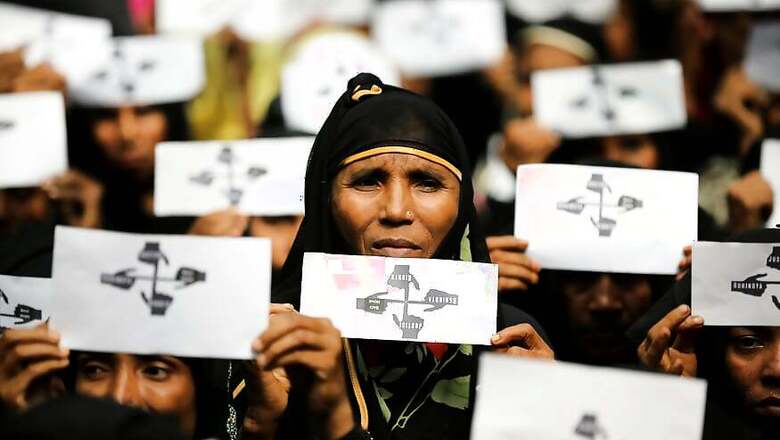
views
Kutupalong, Bangladesh: Thousands of Rohingya Muslim refugees on Saturday marked the one-year anniversary of the attacks that sent them fleeing to safety in Bangladesh, praying they can return to their homes in Myanmar and demanding justice for their dead relatives and neighbors.
More than 15,000 gathered in the morning on a hilltop in the Kutupalong refugee camp, part of a sprawling web of settlements that are now home to nearly 900,000 Rohingya who have fled Myanmar.
"25th August — Black Day," one banner announced.
The protesters —men, women and children —marched through the muddy camp, chanting slogans such as "No more genocide, we want justice." At a mass prayer rally, one speaker repeatedly shouted the question "Who are we?" to which the crowd responded in chorus: "Rohingya! Rohingya!"
Most people cried as they raised their hands while an imam who led the prayer sought God's blessings, saying "please consider the people who have been killed as martyrs and place them in heavens."
Some of the protesters carried paper flags of Myanmar. Newly setup shops inside the camp were closed during the protest that continued for several hours.
The camps exploded in size last year when Myanmar's army launched a wave of anti-Rohingya attacks about Aug. 25, and some 700,000 Rohingya began pouring across the border. Thousands were killed in the violence.
"We are Rohingya, we are Muslims, we have been driven away from our land, from our homes," the unidentified speaker told the crowd. "We want justice. We want to go back to our homes."
But many doubt they'll ever be able to return despite more than a year of talks among Myanmar, Bangladesh, the United Nations and international aid agencies. Myanmar insists the Rohingya can return, and has built a series of camps for them, but few believe they would be safe there, or that they could finally be accepted as citizens.
While Rohingya have lived for centuries in Myanmar, they have long been treated as outsiders, Muslims in a largely Buddhist nation who are denied citizenship and many basic rights. Many in Myanmar ridicule them as "Bengalis" who came illegally from Bangladesh.
Most live in poverty in Myanmar's Rakhine state, just across the border from Bangladesh. Over the past couple decades, over 100,000 have fled into Bangladesh in earlier waves of violence.
The latest violence began on Aug. 24, with a series of attacks on Myanmar police stations by a small Rohingya militant group that killed a dozen security personnel. In retaliation, the Myanmar military and Buddhist mobs launched waves of attacks, killing people and emptying villages in what many in the international community see as a calculated attempt to drive the Rohingya from the country.




















Comments
0 comment